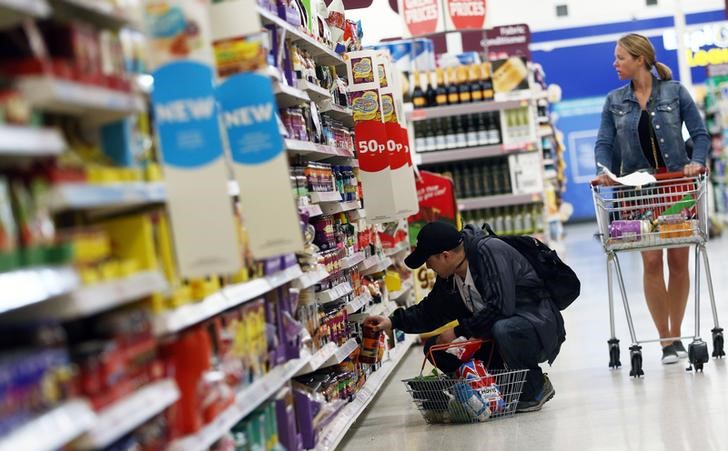By David Milliken and Paul Sandle
LONDON (Reuters) - British retail sales growth slowed broadly as expected in July after a strong second quarter, as shoppers cut back on purchases of most goods other than food, adding to worries about a fall in consumer demand caused by higher inflation.
Year-on-year retail sales growth dropped to 1.3 percent in volume terms, down from 2.8 percent in June, the Office for National Statistics said on Thursday, a shade lower than the 1.4 percent rise forecast by economists in a Reuters poll.
Looking at the three months to July as a whole, which smoothes out monthly volatility in the data, annual sales growth was the weakest since November 2013 at 1.8 percent.
"The relatively weak retail sales figures out today point to a continuing trend of subdued growth, as consumers feel the pinch following the rise in inflation costs," said Yael Selfin, chief economist at accountants KPMG.
A separate survey by market research company Nielsen showed the highest proportion of households in two years tried to save money through tactics such as switching to cheaper grocery brands.
Rising inflation has eaten into British consumers' disposable income this year, causing the weakest first quarter for retail sales since 2010, as the fall in the pound after last year's Brexit vote pushed up the cost of imports.
Official data on Wednesday showed wages in the second quarter were 0.5 percent lower in real terms than in 2016, one of the biggest falls in the past three years.
There are some signs, however, that the rapid rise in inflation - which has quadrupled over the past year - is starting to level off.
The Bank of England expects consumer price inflation to peak at around 3 percent in October, compared with 2.6 percent now, and the measure of inflation used to calculate retail sales volume growth held steady at a six-month low of 2.7 percent.
"As the inflationary effect of sterling's fall fades next year, there should be scope for sales volumes growth to accelerate," said Ruth Gregory of consultancy Capital Economics.
Nonetheless, in July the volume of purchases of almost all types of goods other than food dropped month-on-month, the ONS said.
"The underlying trend at the beginning of 2017 showed a relatively subdued picture for retail sales," ONS statistician Ole Black said. "Whilst the overall growth (in July) is the same as in June, trends in growth in different sectors are proving quite volatile."
Clothing sales fell by the most since December 2016 on a monthly basis in July, after hotter than usual weather boosted demand in June.
Retail sales in cash terms were 4.1 percent higher than July 2016, the smallest increase since January.
Weaker consumer demand is a key reason why most economists predict overall economic growth in Britain will slow this year, though the BoE expects stronger exports and business investment to largely compensate.

The chief executive of one of Britain's biggest car dealership chains, Lookers (L:LOOK), told Reuters on Wednesday he now expects the British new car market to shrink by 3 percent this year, downgrading his outlook due to Brexit and political uncertainty.
(Graphic by Andy Bruce; Editing by Andrew Bolton)